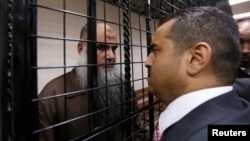A Jordanian court on Thursday acquitted al-Qaida-linked Muslim cleric Abu Qatada, who was extradited from Britain last year, of charges of plotting an attack on the American school in the capital, Amman.
But authorities will continue to detain the preacher because of separate charges related to a plot to attack tourists during Jordan's New Year celebrations in 2000.
“The court announces the acquittal of the defendant for lack of evidence,” said Ahmad Qatarneh, the judge presiding over the three-man military tribunal, which has drawn the criticism of human rights advocates.
Abu Qatada, who was deported from Britain last July after a 10-year legal battle, smiled and looked relaxed during the half-hour court session. Dressed in brown prison fatigues, he was flanked by black-clad security officers.
Members of his family cried out for joy when the verdict was read and his wife and her relatives burst into tears.
“Thanks and praise to God!” they shouted.
Tried in absentia
The Palestinian-born preacher was condemned to death in absentia in 1999 by an Amman court for conspiracy to carry out an attack on the American school. The sentence was immediately commuted to life imprisonment with hard labor.
A year later, he was sentenced in absentia to 15 years for plotting to attack tourists in Jordan during millennium celebrations.
Thursday's session was a retrial in which the prosecution had argued Abu Qatada was a mentor to militant cells in Jordan while he was in Britain, providing spiritual and material support to a campaign of violence during the late 1990s.
But the court quashed the conspiracy charges and postponed another hearing on the New Year plot charges until Sept. 7.
Reacting to the ruling, British Immigration and Security Minister James Brokenshire said the retrial was made possible due to the British government's "determination to successfully deport him from the UK."
"While the courts in Jordan have acquitted Abu Qatada of one of the two charges against him, it is right the due process of law is allowed to take place in his own country," Brokenshire said in a statement.
Abu Qatata's defense lawyer Ghazi Thunaibat said he hoped the second trial would bring a similar sentence.
“My client has spent too long in prison unfairly and we hope the next verdict will finally end his plight and allow him to resume a normal life with his family,” he told Reuters.
In December, Thunaibat called for his client's release, saying his rights had been violated by the presence of the military judge in court and reliance on hearings of evidence extracted under torture from other defendants.
Despite the acquittal, the court upheld a confession which had convicted Abu Qatada in absentia in the earlier trial. The defense said the confession had been extracted under torture.
European and British courts used the confession to delay his deportation until he agreed to return to Jordan for a retrial.
“Human Rights Watch is troubled by the verdict that made it permissible to include allegations of a confession made under coercion that was held in doubt by British courts and the European court of Human Rights,” said Adam Coogle, a Human Rights Watch researcher who attended the session.
Extradition treaty
Abu Qatada's return to Jordan was made possible by an extradition treaty adopted by Jordan and Britain that satisfied the concerns of British judges about the use of evidence obtained through torture.
Jordan regularly arrests Islamist suspects and puts them on trial in military courts that rights groups say are illegal and lack proper legal safeguards. Jordan denies it convicts people using confessions extracted under duress.
Linked by a Spanish judge to the late al-Qaida leader Osama Bin Laden, Abu Qatada has been in and out of jail in Britain since 2001. He was extradited to Jordan in July last year.
Jordanian security officials and experts on Islamist radical groups say Abu Qatada's ideological writings have influenced many youths involved with al-Qaida.
“This is a man who the British courts have deemed a risk to national security. He is not coming back,” British Prime Minister David Cameron's spokesman told reporters on Thursday.
“He will not be granted permission to enter the UK, end of story. He was deported on an indefinite deportation order.”
Abu Qatada has used some hearings to lend support to global al-Qaida chief Ayman al-Zawahiri in a row with a splinter group, the Islamic State of Iraq and the Levant (ISIL), which took control of swathes of land in Iraq this month and is in Syria.
Some information for this report provided by Reuters, AFP and AP.





